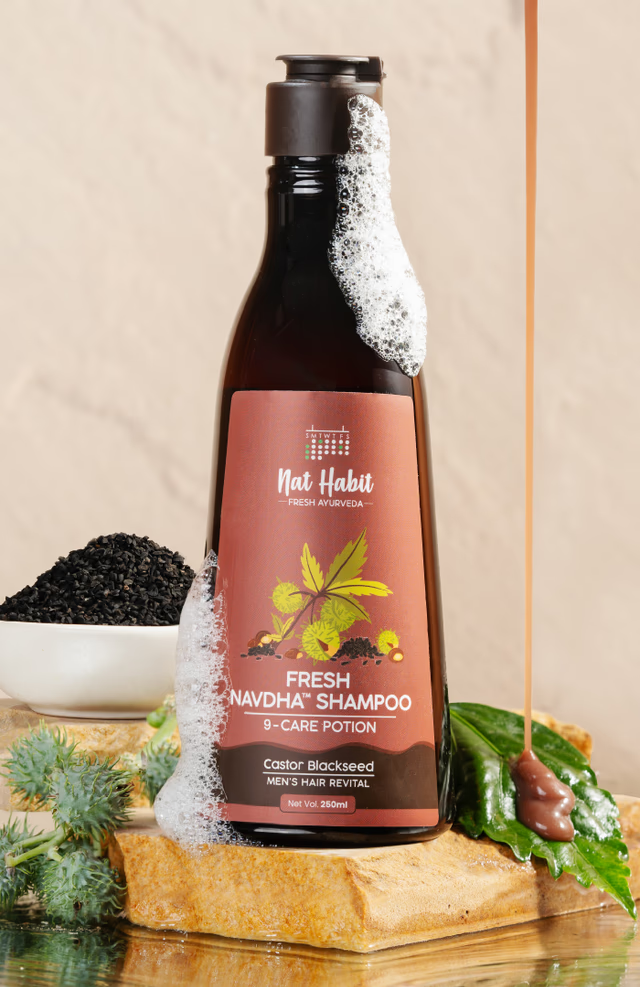Castor Blackseed Navdha Shampoo
Original price was: ₹497.0.₹355.0Current price is: ₹355.0.
How to Use
- Description
- Additional information
- Reviews (0)
- Q & A
- Sustainability Remark
- More Offers
- Store Policies
- Inquiries
Castor Oil
Rich in fatty acids & vit E, immensely moisturises, conditions and boosts hair growth.
Kalonji Paste
Thymoquinone reduces inflammation and oxidative stress; strengthening follicles and fatty amino acids sealing in moisture.
Strengthens follicle and prevents radicular damage.
Natural saponins & surfactants effectively cleanse without stripping off natural oils, balance sebum and improve hair texture.
Loaded vit C strengthens hair, boosts collagen and clarifies scalp.
Bioavailable nutrients & proteins moisturise hair, nourish roots, strengthen tresses and boost hair growth.
Wholesome 9-Care Potion
Why you’ll love it
Only Natural Care
✓ Longer Moisture Lock with fermented proteins & oils.
✓ Easy fomaing leading to reduced hairfall right from 1st wash.
✓ 9-in-1 benefits with 100% nature
✓ NO SLS/ SLES, parabens or chemicals.
| Weight | 0.25 kg |
|---|
You must be logged in to post a review.
Q & A
Ingredients and Sourcing
1. Sustainable Farming Practices:- Castor Oil: Derived from the castor bean plant, castor oil production often involves sustainable agricultural practices. Castor plants are hardy and can grow in various climates without the need for excessive water or chemical inputs .
- Black Seed Oil: Sourced from Nigella sativa seeds, black seed oil is typically cultivated using organic farming methods that avoid synthetic pesticides and fertilizers, reducing environmental impact .
- Both castor and black seeds are renewable resources that can be harvested annually, ensuring a continuous and sustainable supply without depleting natural resources.
Manufacturing Processes
1. Eco-Friendly Extraction Methods:- Cold Pressing: The oils are often extracted using cold-pressing methods, which do not require energy-intensive processes or chemicals, thereby reducing the carbon footprint .
- Manufacturers may use energy-efficient equipment and renewable energy sources (e.g., solar or wind power) in their production facilities to further reduce the carbon footprint .
Packaging
1. Biodegradable or Recyclable Materials:- Sustainable shampoos often use packaging made from recycled or biodegradable materials. This minimizes waste and the carbon footprint associated with the production and disposal of packaging .
- Reducing the amount of packaging material and avoiding unnecessary layers can also lower the environmental impact. Lightweight packaging reduces transportation emissions .
Transportation
1. Local Sourcing:- Sourcing ingredients locally or regionally can significantly reduce transportation-related emissions compared to importing ingredients from distant locations .
- Utilizing efficient logistics and distribution networks can further minimize the carbon footprint by optimizing routes and reducing the number of trips needed for transportation .
Scientific Explanation
1. Life Cycle Assessment (LCA):- An LCA of the Castor Blackseed Shampoo would show lower greenhouse gas emissions across its life cycle stages (sourcing, manufacturing, packaging, and distribution) due to the factors mentioned above. Scientific studies on similar products have demonstrated that sustainable farming and eco-friendly manufacturing significantly reduce the overall carbon footprint .
- Plants like castor and black seeds contribute to carbon sequestration during their growth phase, which can offset some of the carbon emissions generated during production and transportation .
References
- Source on sustainable farming practices for castor plants.
- Source on environmental benefits of castor oil production.
- Source on organic farming methods for Nigella sativa.
- Source on eco-friendly extraction methods like cold pressing.
- Source on energy-efficient manufacturing processes.
- Source on biodegradable and recyclable packaging.
- Source on minimalist packaging practices.
- Source on benefits of local sourcing.
- Source on efficient logistics for reducing carbon footprint.
- Study on Life Cycle Assessment (LCA) for sustainable products.
- Source on carbon sequestration by plants.
General Inquiries
There are no inquiries yet.



















Reviews
There are no reviews yet.